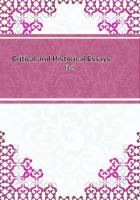I used to listen hungrily to his tales, full of the marvels which make men, as well as children, rapturously devour stories in which truth assumes the most grotesque forms. His passion for mystery, and the credulity natural to the young, often led us to discuss Heaven and Hell. Then Louis, by expounding Swedenborg, would try to make me share in his beliefs concerning angels. In his least logical arguments there were still amazing observations as to the powers of man, which gave his words that color of truth without which nothing can be done in any art. The romantic end he foresaw as the destiny of man was calculated to flatter the yearning which tempts blameless imaginations to give themselves up to beliefs. Is it not during the youth of a nation that its dogmas and idols are conceived? And are not the supernatural beings before whom the people tremble the personification of their feelings and their magnified desires?
All that I can now remember of the poetical conversations we held together concerning the Swedish prophet, whose works I have since had the curiosity to read, may be told in a few paragraphs.
In each of us there are two distinct beings. According to Swedenborg, the angel is an individual in whom the inner being conquers the external being. If a man desires to earn his call to be an angel, as soon as his mind reveals to him his twofold existence, he must strive to foster the delicate angelic essence that exists within him. If, for lack of a lucid appreciation of his destiny, he allows bodily action to predominate, instead of confirming his intellectual being, all his powers will be absorbed in the use of his external senses, and the angel will slowly perish by the materialization of both natures. In the contrary case, if he nourishes his inner being with the aliment needful to it, the soul triumphs over matter and strives to get free.
When they separate by the act of what we call death, the angel, strong enough then to cast off its wrappings, survives and begins its real life. The infinite variety which differentiates individual men can only be explained by this twofold existence, which, again, is proved and made intelligible by that variety.
In point of fact, the wide distance between a man whose torpid intelligence condemns him to evident stupidity, and one who, by the exercise of his inner life, has acquired the gift of some power, allows us to suppose that there is as great a difference between men of genius and other beings as there is between the blind and those who see. This hypothesis, since it extends creation beyond all limits, gives us, as it were, the clue to heaven. The beings who, here on earth, are apparently mingled without distinction, are there distributed, according to their inner perfection, in distinct spheres whose speech and manners have nothing in common. In the invisible world, as in the real world, if some native of the lower spheres comes, all unworthy, into a higher sphere, not only can he never understand the customs and language there, but his mere presence paralyzes the voice and hearts of those who dwell therein.
Dante, in his /Divine Comedy/, had perhaps some slight intuition of those spheres which begin in the world of torment, and rise, circle on circle, to the highest heaven. Thus Swedenborg's doctrine is the product of a lucid spirit noting down the innumerable signs by which the angels manifest their presence among men.
This doctrine, which I have endeavored to sum up in a more or less consistent form, was set before me by Lambert with all the fascination of mysticism, swathed in the wrappings of the phraseology affected by mystical writers: an obscure language full of abstractions, and taking such effect on the brain, that there are books by Jacob Boehm, Swedenborg, and Madame Guyon, so strangely powerful that they give rise to phantasies as various as the dreams of the opium-eater.
Lambert told me of mystical facts so extraordinary, he so acted on my imagination, that he made my brain reel. Still, I loved to plunge into that realm of mystery, invisible to the senses, in which every one likes to dwell, whether he pictures it to himself under the indefinite ideal of the Future, or clothes it in the more solid guise of romance.
These violent revulsions of the mind on itself gave me, without my knowing it, a comprehension of its power, and accustomed me to the workings of the mind.
Lambert himself explained everything by his theory of the angels. To him pure love--love as we dream of it in youth--was the coalescence of two angelic natures. Nothing could exceed the fervency with which he longed to meet a woman angel. And who better than he could inspire or feel love? If anything could give an impression of an exquisite nature, was it not the amiability and kindliness that marked his feelings, his words, his actions, his slightest gestures, the conjugal regard that united us as boys, and that we expressed when we called ourselves /chums/?
There was no distinction for us between my ideas and his. We imitated each other's handwriting, so that one might write the tasks of both.
Thus, if one of us had a book to finish and to return to the mathematical master, he could read on without interruption while the other scribbled off his exercise and imposition. We did our tasks as though paying a task on our peace of mind. If my memory does not play me false, they were sometimes of remarkable merit when Lambert did them. But on the foregone conclusion that we were both of us idiots, the master always went through them under a rooted prejudice, and even kept them to read to be laughed at by our schoolfellows.
I remember one afternoon, at the end of the lesson, which lasted from two till four, the master took possession of a page of translation by Lambert. The passage began with /Caius Gracchus, vir nobilis/; Lambert had construed this by "Caius Gracchus had a noble heart.""Where do you find 'heart' in /nobilis/?" said the Father sharply.













